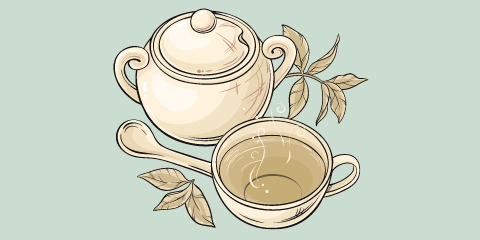The Perfect Cup Of Tea

There are a number of factors that determine how pleasant the taste of your tea is. These extra steps, in addition to the normal brewing instructions, will elevate your tea to new heights.
Cover your Tea
The act of covering your tea ensures warmth, full extraction, and that the volatile essential oils of the herbs (which are very beneficial) stay in your cup.
The act of covering your tea ensures warmth, full extraction, and that the volatile essential oils of the herbs (which are very beneficial) stay in your cup.
Use Good Water
When making any tea, be sure you begin with good water since it makes up over 90% of the end product. Water quality and taste vary greatly between locales. If your water tastes really good out of the tap, chances are it will make good tea.
If there is a noticeable unpleasant taste (metallic, chlorine, earthiness, etc.) it will come through in the tea. A simple, inexpensive solution is a store-bought water filter. Springwater also works well. For best results, always make tea with fresh water, not water that has been previously boiled or has been sitting around. It is not suggested to use distilled water.
Heat the Teapot
If you are using a teapot to make tea, pour a small amount of hot water into the pot to warm it before beginning to make your tea.
Measure the Tea
The standard guideline for tea is to use one rounded, measuring teaspoon of tea for every 240 ml of water. When measuring, take the leaf size into account. For example, if you are preparing a very fine particle tea, use a level teaspoon. If you are preparing a large-leaf, bulky tea, such as Mountain Tea, use two teaspoons per cup. In either case, the approximate weight of the tea should be 3 grams of tea per cup.
Time the Steep
Some teas, if steeped for too long, they often become bitter. Pouring additional water might subdue the bitter taste. Using a timer when steeping tea is highly recommended.
If there is a noticeable unpleasant taste (metallic, chlorine, earthiness, etc.) it will come through in the tea. A simple, inexpensive solution is a store-bought water filter. Springwater also works well. For best results, always make tea with fresh water, not water that has been previously boiled or has been sitting around. It is not suggested to use distilled water.
Heat the Teapot
If you are using a teapot to make tea, pour a small amount of hot water into the pot to warm it before beginning to make your tea.
Measure the Tea
The standard guideline for tea is to use one rounded, measuring teaspoon of tea for every 240 ml of water. When measuring, take the leaf size into account. For example, if you are preparing a very fine particle tea, use a level teaspoon. If you are preparing a large-leaf, bulky tea, such as Mountain Tea, use two teaspoons per cup. In either case, the approximate weight of the tea should be 3 grams of tea per cup.
Time the Steep
Some teas, if steeped for too long, they often become bitter. Pouring additional water might subdue the bitter taste. Using a timer when steeping tea is highly recommended.
